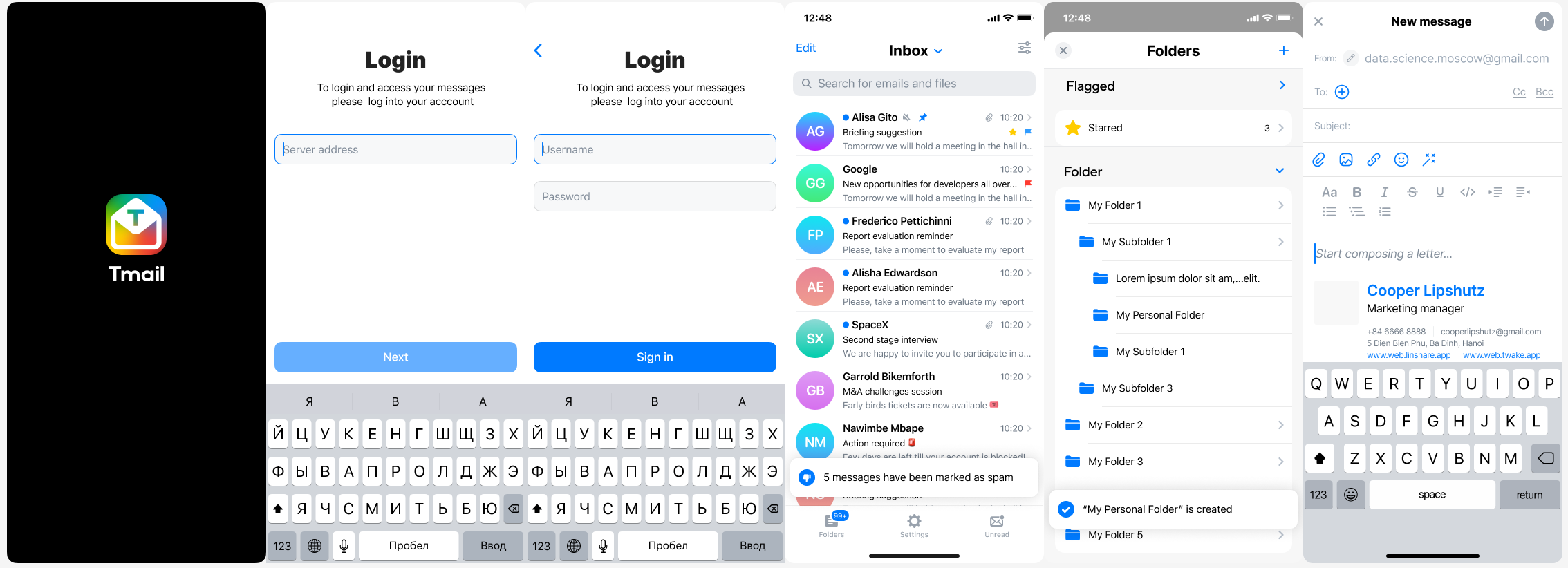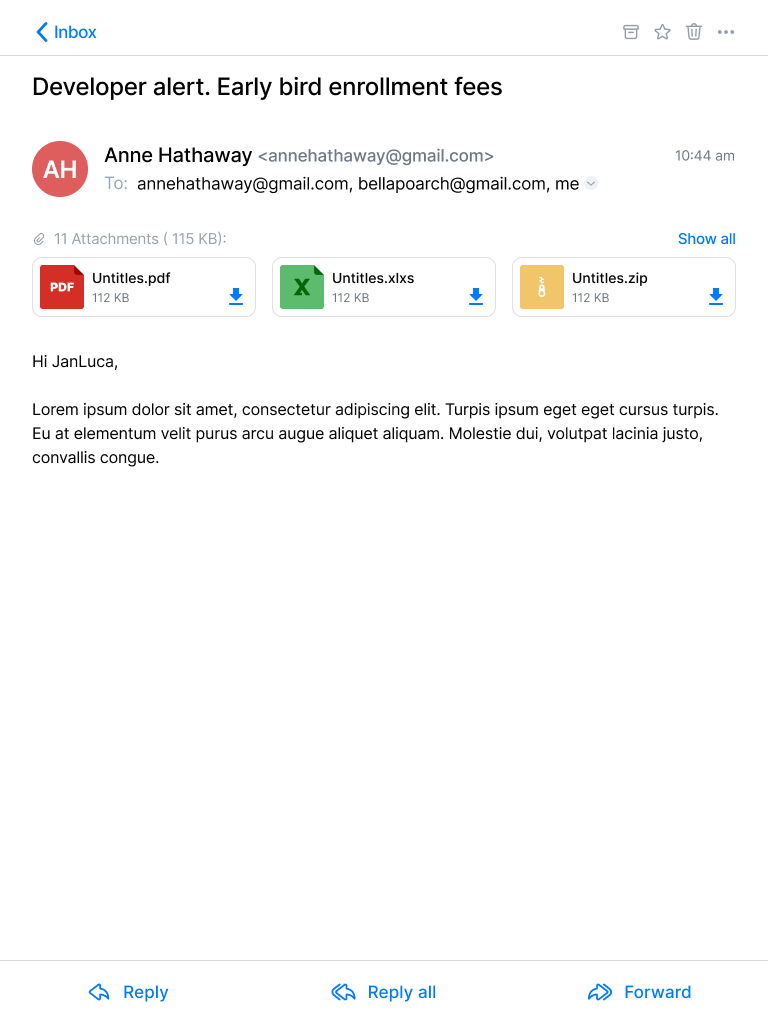This project aims at providing a multi-platform mobile email application, running the JMAP protocol and will also deliver additional features to the Team Mail back-end.
Here is how Team Mail looks like on a phone:
Here is how Team Mail looks like on a tablet:
- Go to root folder of project
- Run
prebuild.shscript
/bin/bash prebuild.sh
- Build
- iOS:
flutter build ios
- Android:
flutter build apk
- Web:
change SERVER_URL in env.file with your JMAP server
SERVER_URL=http://your-jmap-server.domain
then run:
flutter build web
or you can find our images in: https://hub.docker.com/r/linagora/tmail-web
Read more...
That is a good question! **IMAP** is THE ubiquitous protocol people use to read their emails, THE norm.Yet IMAP had been designed in another age, which resulted in a chatty patchwork of extensions. IMAP lacks decent synchronisation primitives to address real-time challenges modern mobile fleet requires, it consumes a lot of bandwith, requires a lot of roundtrips which means high latency.
We are not alone to say this! Big players of the field started their own proprietary protocols to address IMAP flaws, and inter-operable standard was yet to be found...
This, is where JMAP comes to play! JMAP builds on decades of experience, and beautifully addresses these challenges using HTTP and JSON standards. Not only does it make applications easier to develop, we also strongly believes it results in an improved experience for the end user.
Yes, you can use the Team Mail application with any JMAP server and benefits from Team Mail ergonomy and ease of use.
Read more...
Don't worry, we are here!We plan on writing a user documentation, helping you navigating around the application, and detailing the few configurations you have to perform.
If what you are looking for is not in the user guide then ask us directly in the issues first, we would be glad to help. But also glad to improve our documentation and maybe tweak slightly our UI (user interface).
Read more...
First, we target Android, iOS mobiles. We also take care of tablets and large rendering space early on in the development process.Then, we plan on introducing a desktop application.
This versatility is enabled by the use of the Flutter framework.
Read more...
First, we plan to write a simple, multi-platform JMAP email client. This includes reading your mails and mailboxes, managing them, sending emails, searching your emails. This will likely keep us busy by the end of 2021.Then, we have plan for multiple features including:
- Support for Team Mail encrypted mailbox (GPG)
- Support for Team Mail shared mailboxes
- Support for Team Mail filters
- Interactions with some other software from Linagora including:
No we do not plan to support such extensions, that are currently not standardized as RFCs, nor implemented on the Team Mail backend.
Read more...
Yes! It is still in early development but we do have one. It's easy for you to use locally, as you can just build a Docker image locally from the sources of this repository, or even use our official Docker image `linagora/tmail-web`.The web-app needs to include an environment file though (here you can see the dummy env.file at the root of the project),
with a SERVER_URL parameter, so it knows to which backend it needs to connect to.
For this to run it locally for example, 2 ways:
Edit the env.file by replacing the default value of SERVER_URL to the one pointing to your JMAP backend server.
Then build your docker image:
docker build -t tmail-web:latest .Then you can just simply run your web-app like this:
docker run -d -ti -p 8080:80 --name web tmail-web:latestThen go to http://localhost:8080 and you should be able to login against your JMAP backend using the Team Mail web-app.
You can use our official image linagora/tmail-web or just build the docker image locally without any prior changes:
docker build -t tmail-web:latest .From then, create at the root of the project an environment file (like env.dev.file) where you put the SERVER_URL
you want to connect to. Then, to mount it and override the default one while running the container:
docker run -d -ti -p 8080:80 --mount type=bind,source="$(pwd)"/env.dev.file,target=/usr/share/nginx/html/assets/env.file --name web tmail-web:latestThen go to http://localhost:8080 and you should be able to login against your JMAP backend using the TMail web-app.
We also include a docker-compose.yaml file so you can get a testing environment up quickly. This use our tmail-backend image for the JMAP server.
Here are the steps to setup:
- Generate JWT keys for
tmail-backend:
openssl genpkey -algorithm rsa -pkeyopt rsa_keygen_bits:4096 -out jwt_privatekey
openssl rsa -in jwt_privatekey -pubout -out jwt_publickey- Edit the
env.fileand setSERVER_URLtohttp://localhost/(with the trailing slash) - Run
docker compose up -dto bring up both the frontend and the backend. - Run
docker compose exec tmail-backend /root/provisioning/provisioning.shto provision some demo accounts (you don't have to let it run all the way). - The TMail web-app should be available at
http://localhost:8080. The credentials for demo accounts are:
User: alice@localhost
Password: aliceSecret
User: bob@localhost
Password: bobSecret
User: empty@localhost
Password: emptrySecret
- [Enable and customize the Application grid](docs/configuration/app_grid_configuration.md)
- [Change logos](docs/configuration/tmail-web-logo.md)
Read more...
Thanks for the enthousiasm!There are many ways to help us, and amongst them:
- Spread the word: Tell people you like Team Mail, on social medias, via blog posts etc...
- Give us feedbacks... It's hard to make all good decisions from the first time. It is very likely we can benefit from your experience. Did you encountered annoying bugs? Do you think we can better arrange the layout? Do you think we are missing some features critical to you? Tell us in the issues.
- I can code! I wanna help ;-). Wow thanks! Let's discuss your project together in the issues to get you on track!
You would be pleased to know we contributes a JMAP Dart client that you can reuse to write your own applications. Feels free to open pull requests and enrich it!



